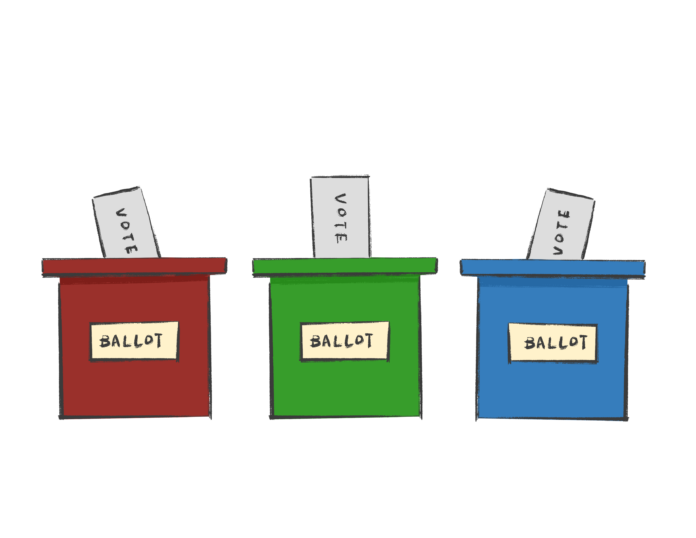In light of the recent election, third-party voters share their thoughts
By LAILA AZHAR — features@theaggie.org
Since 1853, the president of the United States — with the exception of Andrew Johnson, who became an Independent after becoming unpopular within his party — has been either a Democrat or a Republican.
For many people, voting for a presidential candidate outside of the two major parties is unthinkable.
UC Los Angeles student Hamza Khan understands why his decision to vote third party was surprising to others.
“A lot of people just see it as: why would you vote for a candidate who has no chance at winning?” Khan said. “But I think there’s more to consider than just that.”
In the recent 2024 election, NBC News reported a total of just under 2.7 million third-party votes, in comparison to president-elect Donald Trump’s 75.9 million and current Vice President Kamala Harris’ 72.9 million.
For voters such as 2024 UC Davis graduate Noorulain Ali, the decision to vote third party was heavily influenced by the conflict in Palestine.
“I definitely stopped supporting the Democratic party after the way the situation in Palestine was handled by [President Joe] Biden,” Ali said.
It’s no coincidence that a significant percentage of Muslims in the United States voted third party this year. 53% of Muslim voters voted for Green party candidate Jill Stein, and only 20% voted for Kamala Harris, according to an exit poll conducted by the Council on American-Islamic Relations (CAIR).
This marks a major shift in Muslim voters turning away from the Democratic party. In 2020, 65% of Muslim voters voted for Biden.
“Although Muslims constitute roughly 1% of the American population, they are an important voting bloc because they are concentrated in swing states, which are often narrowly won in elections,” an Al Jazeera op-ed by Dalia Mogahed and Saher Selod reads.
In 2020, for example, over 60,000 Muslims voted in the state of Georgia — a state which Biden won by a margin of only 12,000 votes. In Pennsylvania, which he won by 81,000 votes, 125,000 Muslims voted. Four years ago, Biden won Michigan — a state with 240,000 Muslim voters — by 155,000 votes. This year, the state was home to the Uncommitted Movement, which protested Biden’s nomination.
This election has left Muslim voters feeling abandoned by both major parties.
“On one hand, the Democrats are facilitating a genocide abroad,” Khan said. “But on the other hand, Trump has sparked a lot of inflammatory rhetoric about immigrants, notably from Muslim-majority countries, which makes things dangerous for those of us here. It’s a lose-lose situation.”
Some view third-party voting as a step toward a more equitable form of election.
“We deserve better than a two-party system,” Khan said. “If we’re stuck between the same two options every time, it means politicians aren’t ever incentivized to be better, or to be actually good. People just vote along party lines.”
Following the results of the recent election, many took to social media to express their frustration with third-party voters.
“Generally…what was Third party voters thought process,” a tweet with over 79,000 likes reads.
To some, this sentiment feels unfair.
“I don’t understand how people can see the images that have come out of Gaza and fault others for not voting for someone who served under the administration in charge while all of this is going on,” Khan said.
The vote of every third-party voter wouldn’t have alone changed the outcome for Harris — not the popular or electoral vote. Especially for voters in California, a state which is called for the Democratic party as soon as polls close, third-party voters likely didn’t impact the results of the election.
“It’s not right to blame us for the way things turned out,” Khan said.
Parties are eligible for public funding if they receive 5% of the popular vote in a presidential election, a fact that some cite as influencing their decision to vote third party.
“Even if a candidate doesn’t win, if they can just reach that 5%, it’ll impact the amount of resources they get,” Ali said.
Megan Le, a third-year economics major, is not a third-party voter, but she doesn’t agree with the outrage that has been directed at them. For her, the onus is on politicians to appeal to voters.
“I think it’s better to be a third-party voter than to be completely disengaged from politics. At least you’re making a decision and doing what you think is best for the country, instead of just apathy,” Le said. “I don’t think voters should have to vote for a candidate they find legitimately appalling. I think politicians have a responsibility to create platforms that resonate with the people they’re trying to serve.”
Regardless of who one voted for in the recent election, it’s likely that everyone has something they’d like to change about the system.
“At the end of the day, it’s all about what someone thinks is best,” Khan said. “People will come to different conclusions about strategy. But I think we should be looking to our politicians to lead better and not pointing the blame at each other.”
Written by: Laila Azhar — features@theaggie.org





